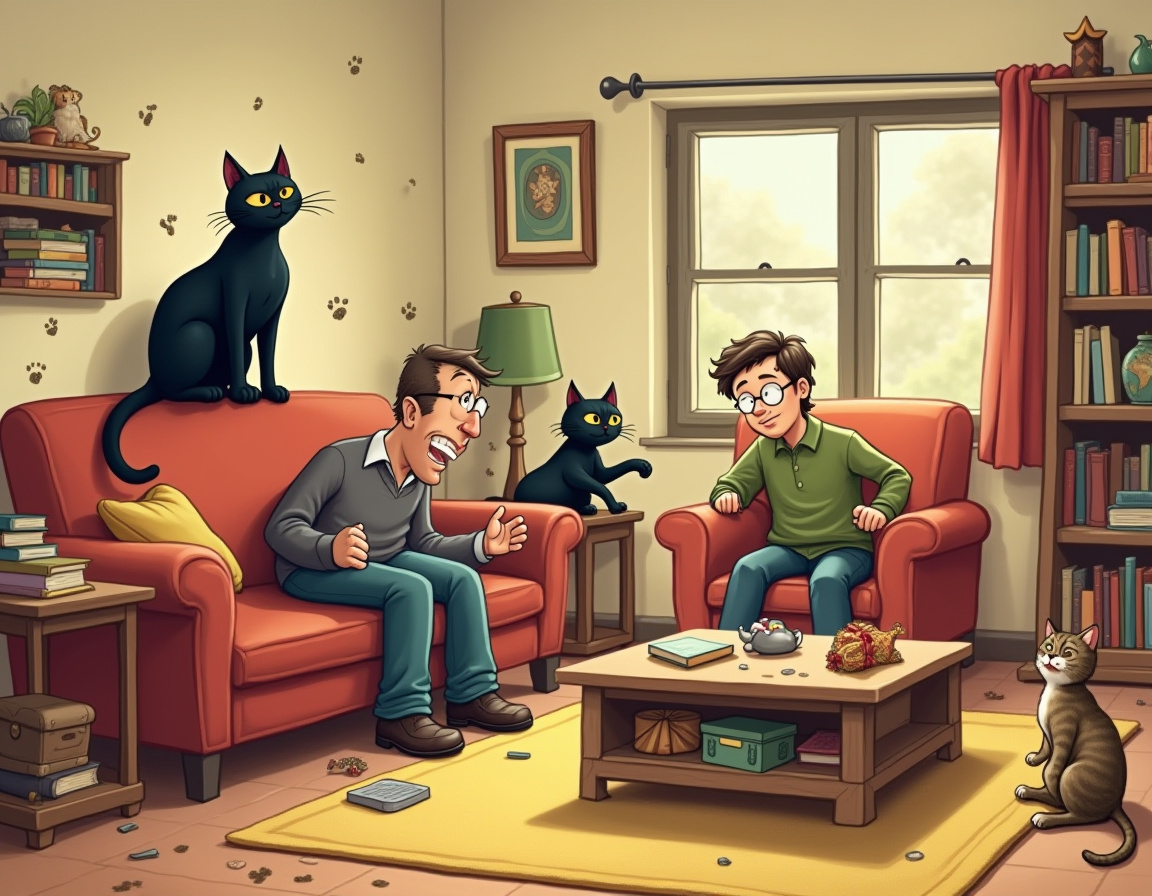Top 10 Reasons Cats Are Evil: Debunking the Myth
The Misunderstood Nature of Cats
Cats have long been a source of fascination, admiration, and yes—sometimes frustration—for their human companions. While many people adore their feline friends for their independence and charm, others jokingly refer to cats as “evil” due to their mischievous behaviors and aloof tendencies. But are cats truly evil, or is this label just a playful exaggeration?
In this article, we’ll explore the top 10 reasons cats are evil, but with a twist: we’ll also delve into why these so-called “evil” traits often endear them to us even more. Whether you’re a cat lover looking for a laugh or someone trying to understand your furry roommate’s quirks, this guide will provide insight into the fascinating world of feline behavior.
1. They Knock Things Off Tables (And Seem to Enjoy It)
One of the most infamous behaviors that lands cats on the list of the top 10 reasons cats are evil is their tendency to knock objects off tables, shelves, and countertops. From vases to glasses, nothing seems safe from their curious paws.
Why Do Cats Do This?
- Curiosity: Cats are natural explorers who investigate their surroundings by pawing at objects.
- Playfulness: Knocking items over can be a form of entertainment, especially if it elicits a reaction from their humans.
- Attention-Seeking: If they notice you react strongly when something falls, they may repeat the behavior to engage with you.
While this habit might seem malicious, it’s often rooted in innocent curiosity. To minimize damage, keep fragile items out of reach and provide alternative toys to redirect their energy.
2. Their Aloofness Feels Like Rejection
Cats are notorious for being less overtly affectionate than dogs, which leads some people to believe they’re cold or indifferent. This perceived aloofness is often cited as one of the top 10 reasons cats are evil.
Understanding Feline Independence
- Nature vs. Nurture: Unlike dogs, cats evolved as solitary hunters, making them naturally more independent.
- Selective Affection: When a cat chooses to show affection, it feels earned rather than automatic, adding to its value.
- Communication Style: Cats express love differently—through slow blinks, headbutts, or sitting near you—not always through constant cuddling.
Rather than viewing their independence as rejection, appreciate the moments when they choose to bond with you. These interactions are genuine and meaningful.
3. Midnight Zoomies Drive You Crazy
If you’ve ever been woken up by a sudden burst of energy from your cat racing around the house at 3 a.m., you know why this makes the list of the top 10 reasons cats are evil.
What Causes Midnight Zoomies?
- Nocturnal Instincts: Cats are crepuscular, meaning they’re most active during dawn and dusk.
- Pent-Up Energy: Indoor cats may not get enough exercise during the day, leading to late-night antics.
- Hunting Simulation: Sprinting and leaping mimic hunting behaviors, satisfying their instincts.
To combat midnight zoomies, engage your cat in play sessions before bedtime and provide stimulating toys to tire them out earlier in the evening.
4. They Steal Food Without Guilt
Few things feel more “evil” than watching your cat sneak onto the counter and swipe food right under your nose. Whether it’s a slice of turkey or a piece of cheese, cats don’t hesitate to indulge themselves.
Why Cats Steal Food
- Opportunistic Hunters: In the wild, cats seize opportunities to eat whenever possible.
- Strong Sense of Smell: Their keen noses detect appealing scents, tempting them to investigate.
- Lack of Moral Code: Unlike humans, cats don’t see stealing as wrong—it’s simply survival instinct.
To prevent theft, store food securely and discourage counter-surfing early on. Redirect their attention with treats designed specifically for cats.
5. They Bite When You Least Expect It
Another reason cats earn their spot among the top 10 reasons cats are evil is their unpredictable biting behavior. One moment they’re purring contentedly, and the next, they sink their teeth into your hand.
Reasons Behind Sudden Bites
- Overstimulation: Too much petting can overwhelm sensitive cats, prompting a defensive response.
- Play Aggression: Kittens learn hunting skills through play-biting, which can carry into adulthood.
- Fear or Stress: A startled or anxious cat may lash out defensively.
Learn to read your cat’s body language—flattened ears, twitching tails, or dilated pupils signal discomfort. Respect their boundaries to avoid unexpected bites.
6. They Ignore You Completely
There’s nothing quite like calling your cat’s name only to be met with complete indifference. This selective hearing is another trait that contributes to the perception of cats as “evil.”
Why Cats Ignore Humans
- Selective Attention: Cats respond primarily to sounds or actions that benefit them, such as the rustle of a treat bag.
- Independence: Unlike dogs, cats don’t rely on humans for direction, so they prioritize their own agenda.
- Miscommunication: Cats communicate differently than humans, often using subtle cues we miss.
Instead of taking offense, try using positive reinforcement (like treats or toys) to encourage responsiveness. Over time, they may start associating your calls with rewards.
7. They Poop Outside the Litter Box
Few behaviors frustrate cat owners more than finding poop outside the litter box. This act often lands cats squarely on the list of the top 10 reasons cats are evil.
Possible Explanations
- Health Issues: Urinary tract infections or gastrointestinal problems could cause accidents.
- Dirty Litter Box: Cats are clean animals; a neglected box may deter them from using it.
- Territorial Behavior: Multi-cat households can lead to competition over resources like litter boxes.
Address underlying issues by keeping the litter box clean, consulting a vet if needed, and ensuring there’s one box per cat plus an extra.
8. They Stalk and Pounce on Your Feet
Imagine settling down to relax only to feel sharp claws digging into your ankles as your cat ambushes your feet. This playful yet startling behavior is another reason cats are labeled as “evil.”
Why Cats Exhibit Predatory Play
- Hunting Instincts: Feet moving under blankets mimic prey, triggering their stalking reflex.
- Boredom: Lack of stimulation drives them to create their own fun.
- Bonding Through Play: Some cats view this as a way to interact with their favorite human.
Redirect their predatory instincts with interactive toys like wand teasers or laser pointers. Reward calm behavior to discourage unwanted attacks.
9. They Bring You “Gifts”
Waking up to find a dead mouse or bird left proudly at your doorstep might seem like a cruel prank, earning cats another spot on the top 10 reasons cats are evil list.
The Thought Behind the Gesture
- Hunting Instinct: Cats bring home prey as a natural behavior inherited from their ancestors.
- Teaching Behavior: Mother cats teach kittens to hunt by bringing them food; your cat may think you need lessons too.
- Affectionate Offering: Despite appearances, this gesture reflects trust and care.
While unpleasant, try to see it as a twisted compliment. Discourage hunting by keeping cats indoors or using deterrent collars.
10. They Rule the House Like Tiny Dictators
Finally, cats’ undeniable sense of entitlement cements their place among the top 10 reasons cats are evil. From demanding attention on their terms to claiming every cozy spot in the house, they exude an air of superiority.
Why Cats Act Like Bosses
- Confidence: Cats naturally assert dominance to establish territory.
- Routine-Oriented: They thrive on predictability and expect humans to comply.
- Charismatic Charm: Their confidence and charisma often win us over, even when they’re being bossy.
Embrace their leadership qualities as part of their charm. Set clear boundaries while appreciating their bold personalities.
Addressing Common Questions About Cats’ “Evil” Traits
To help clarify misconceptions, here are answers to frequently asked questions about cats’ seemingly sinister behaviors:
Q: Are cats really evil, or is it all in good fun?
A: Cats aren’t inherently evil—they’re simply following their instincts. Most behaviors deemed “evil” stem from curiosity, boredom, or communication differences.
Q: How can I stop my cat from knocking things over?
A: Provide plenty of interactive toys and secure fragile items. Reward calm behavior to discourage destructive habits.
Q: Why does my cat ignore me but respond to other sounds?
A: Cats prioritize stimuli that directly benefit them, like food-related noises. Use positive reinforcement to train them to respond to your voice.
Conclusion: Celebrating the Quirks That Make Cats Unique
The top 10 reasons cats are evil highlight the quirky, sometimes frustrating, but ultimately endearing traits that define our feline companions. Far from being truly malevolent, cats’ behaviors reflect their instincts, intelligence, and individuality.
By understanding the motivations behind their actions, we can foster stronger bonds with our cats and appreciate the humor and charm they bring to our lives. So the next time your cat knocks over a glass or gives you the cold shoulder, remember—it’s not evil; it’s just…cat logic. And isn’t that what makes them so irresistibly lovable?





